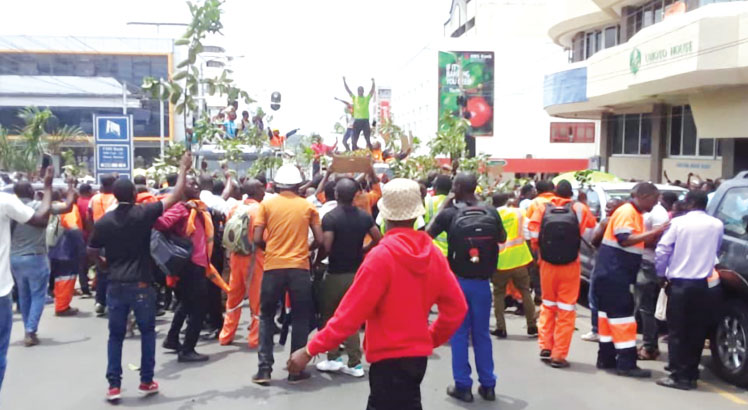Pressure mounts on pay increase
Pressure is mounting on government to increase salaries for workers in its ministries, departments and agencies with an avalanche of ultimatums issued by trade unions pushing for the hike.
Electricity Supply Corporation of Malawi (Escom) Staff Union (ESU) was the first to issue a 14-day ultimatum which expired yesterday while healthcare workers under the National Organisation of Nurses and Midwives (Nonm) and the Physician Assistants Union of Malawi (Paum) have also given government a seven-day ultimatum to implement a 44 percent salary increment or face industrial action on December 29.

Paum and Nonm have also called on government to immediately review and revise downwards the current pay-as-you-earn (Paye) tax to boost workers’ income.
The demands come amid growing probability that the deadlines imposed by various unions for salary increments following the 44 percent kwacha devaluation in November could be affected by the festive season shutdown of the public service.
But in an interview yesterday, ESU secretary general William Mnyamula said their demands remain within the law and should be respected regardless of a government holiday.
He said they have written the government a reminder on their demands which he indicates will be delivered today.
Mnyamula said the Ministry of Labour was yet to respond to their previous call.
He said: “Labour laws say the ministry has to respond within 30 days. We have exhausted the first 14 days and now we are giving the government seven days to respond.
“At 21 days, we will issue another notice of seven days. And on 28 days, we will write a notice of withdrawal of labour if we don’t get a response.”
Nonm vice-president Hanna Mtemang’ombe said they rejected the government’s proposal to have the Ministry of Labour as the negotiator in the matter.
She said yesterday that government has now suggested a new mediator that both Nonm and Paum have agreed to.
Said Mtemang’ombe: “The Ombudsman and the Malawi Human Rights Commission have been engaged as neutral mediators. There’s is progress in the discussions and we’re not worried about the holidays.”
Malawi Congress of Trade Unions (MCTU), which last month also asked the government to provide a 44 percent increment in the minimum wage, said it is scheduled to meet the Government Negotiating Team this Friday.
In an interview yesterday, MCTU president Charles Kumchenga said: “We cannot preempt the agenda of the meeting but obviously it will hover around the impact of the 44 percent devaluation of the kwacha on workers’ salaries.”
Meanwhile, the Ministry of Health has written to the Ministry of Labour to intervene on the matter and have Nonm and Paum concerns heard.
In a letter dated December 19, 2023, Ministry of Health Principal Secretary Samson Mndolo said despite the ministry engaging the two unions on measures that government is taking to cushion health workers, they are not satisfied.
Reads the letter: “Therefore, in light of the escalating disagreement, and in accordance with section 43[2] of the Labour Relations Act, the ministry has resolved to report the matter to your office for conciliation, where the two parties would be properly heard.
“Furthermore, in line with section 43[3] of the Act, it would be a great honour if you could acknowledge receipt of this report within seven [7] days.”
The Ministry of Health has asked if the conciliation process can be concluded within 21 days to be in line with the law.
Ministry of Labour spokesperson Nellie Kapatuka in an interview yesterday confirmed that a meeting has been scheduled to review the wage demands.
“Indeed, there is a scheduled meeting on the review of the minimum wage this week, and we hope that the discussion will be concluded during that meeting,” she said.
Reserve Bank of Malawi Governor Wilson Banda has spoken against salary increment demands in response to the devaluation.
Malawi Government has since set a 10 percent cap for public service salary increments, a development that is facing resistance from trade unionists. n
—Additional reporting by GEORGE SINGINI, Staff Reporter.





